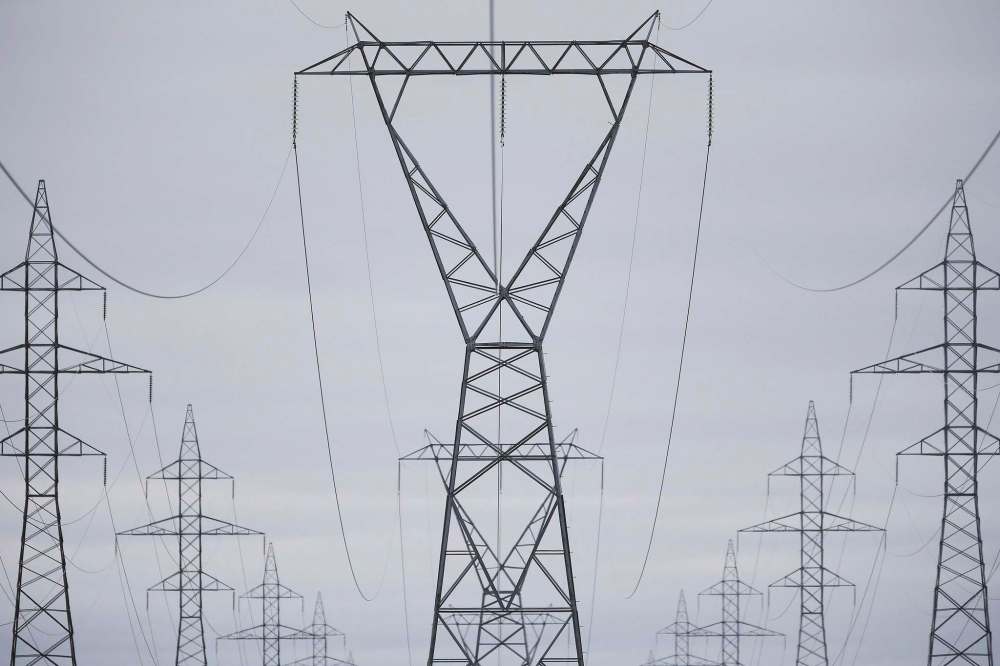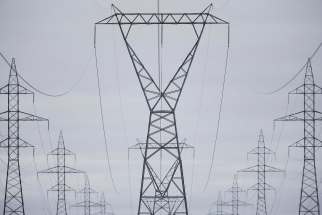Hydro’s $5-billion deals with Saskatchewan ‘deliberately covered up’
Read this article for free:
or
Already have an account? Log in here »
To continue reading, please subscribe:
Monthly Digital Subscription
$0 for the first 4 weeks*
- Enjoy unlimited reading on winnipegfreepress.com
- Read the E-Edition, our digital replica newspaper
- Access News Break, our award-winning app
- Play interactive puzzles
*No charge for 4 weeks then price increases to the regular rate of $19.00 plus GST every four weeks. Offer available to new and qualified returning subscribers only. Cancel any time.
Monthly Digital Subscription
$4.75/week*
- Enjoy unlimited reading on winnipegfreepress.com
- Read the E-Edition, our digital replica newspaper
- Access News Break, our award-winning app
- Play interactive puzzles
*Billed as $19 plus GST every four weeks. Cancel any time.
To continue reading, please subscribe:
Add Free Press access to your Brandon Sun subscription for only an additional
$1 for the first 4 weeks*
*Your next subscription payment will increase by $1.00 and you will be charged $16.99 plus GST for four weeks. After four weeks, your payment will increase to $23.99 plus GST every four weeks.
Read unlimited articles for free today:
or
Already have an account? Log in here »
Hey there, time traveller!
This article was published 23/03/2021 (1719 days ago), so information in it may no longer be current.
A scathing review of Manitoba Hydro failed to disclose the details of two multibillion-dollar power sales to Saskatchewan that are fundamental to the Crown utility’s financial future, the Free Press has learned.
The report, by former Saskatchewan premier Brad Wall, into the Keeyask generating station and Bipole III transmission line concluded the former NDP government rushed to build both projects before getting proper regulatory approval, and failed to provide adequate financial oversight once construction started.
Premier Brian Pallister has used the report to buttress his assertion that Keeyask and Bipole III were the worst examples of NDP mismanagement and incompetence.
However, Hydro sources said it was suspicious the Wall report ignored the effect of two recent power sales to Saskatchewan that were completed last year — well before Wall’s report was finished.
“The utility (Manitoba Hydro) always wanted to make the announcement,” one senior Hydro source said on the condition of anonymity. “This was huge news for us. But, we knew it was not consistent with the current government’s attempts to make the previous government look bad over the construction of Keeyask and Bipole. You can only assume (the Saskatchewan power sale) was deliberately covered up because it didn’t serve their political purposes.”
Hydro rarely releases specific details of export contracts, but current and former Hydro employees confirmed the utility has two firm export contracts with Saskatchewan — one for 100 megawatts and a second for 215 megawatts — that are expected to provide at least $5 billion in revenue over the next 30 years.
Wall’s 172-page report featured only one direct reference to the Saskatchewan power deals, and only to acknowledge they had been completed. There were no details on the size of the deals or the effect they might have on Hydro’s financial outlook.
Sources confirmed, however, the impact will be significant. The utility estimated the power available to Saskatchewan through these two contracts is enough to provide all the electricity needed for 155,000 homes for one year.
For Hydro, the financial implications are extensive. The two Saskatchewan contracts account for more than half of the value of all export contracts held by Hydro, which the sources said is estimated at $9.4 billion. That is nearly double the forecast value of Hydro projects in 2014 ($4.9 billion) when the utility sought approval for Keeyask and Bipole III.
For those within Hydro, the lack of detail about these sales is evidence that politics was used to filter Wall’s report.

Gloria Desorcy, executive director of the Consumers Association of Canada (Manitoba), said as a longtime intervener in Public Utility Board hearings, the absence of details on the Saskatchewan contracts is a major concern given that it should have a positive consequence for ratepayers.
“At a time when we are facing the spectre of above-inflation electricity rate increases, the sale to SaskPower should help to mitigate the cost of Keeyask and Bipole and the Manitoba-Minnesota transmission line,” she said.
Not only was Wall given access to many current and former Hydro employees, and officials from the former NDP government, but he also has a personal connection to the Saskatchewan power sales.
Wall was premier of Saskatchewan when the first 100-megawatt term sheet was signed between SaskPower and Manitoba Hydro. He retired from politics in 2018, a few months before the second term sheet was signed.
“The prospective sale of electricity to SaskPower was not part of the Preferred Development Plan at that time and thus was not germane to our review.”– Brad Wall wrote in his response
Wall declined to be interviewed. However, in written responses, he said he did not ask for, nor was he provided, details of the Saskatchewan power sales because they fell outside the review’s mandate. Wall said he was instructed by the Pallister government to limit his review to the 2014 Preferred Development Plan, the detailed business case that Hydro made public to justify its desire to build Keeyask and Bipole III, and subsequent actions by the NDP government.
“The prospective sale of electricity to SaskPower was not part of the Preferred Development Plan at that time and thus was not germane to our review,” Wall wrote in his response.
However, that claim runs contrary to the description he provided in the introduction of his report, where he made it clear his analysis extended beyond the Preferred Development Plan. Wall wrote that his review “has attempted to quantify the impact of the Bipole III and Keeyask projects on Manitoba Hydro’s financial health and more importantly, on the present and future customers of Manitoba Hydro.”
Consumers group calls for hearing on hydro rates

Posted:
The Consumers Association of Canada will become the second organization in as many weeks to make a statutory request that the Public Utilities Board open a special hearing on Manitoba Hydro finances and rates.
Throughout the report, Wall frequently offered his analysis on what he thought Keeyask and Bipole might do to future hydro rates. The introduction painted a bleak picture of the future faced by Manitoba Hydro as a result of the debt that was accumulated with the construction of Keeyask.
“As a result, ratepayers will be bearing the long-term risk that Keeyask will not generate sufficient export revenue to cover its costs and that the project will not be needed for domestic demand for many years to come,” Wall wrote.
While the Wall report was being scrubbed for meaningful reference to the Saskatchewan deals, Pallister was working to downplay the finalization of the contracts and their effect on Hydro finances, sources said.
Although it is tradition for Hydro to keep the fine details of export deals confidential, the utility and the government normally would announce new power sales with some fanfare, particularly if they were large.
In fact, the Pallister government did make such an announcement in 2018 when it signed a preliminary contract with Saskatchewan for 215 megawatts of electricity. Along with a 2016 term sheet, Manitoba would be providing a total of 315 megawatts to its neighbour.
As part of that announcement, Pallister provided the only quote he has ever uttered on the Saskatchewan power deals. “It’s a significant advance for Manitoba Hydro, and it’s something that shows Manitoba’s sincere commitment to… reducing the carbon output, not only of our province, but also of our neighbouring provinces,” he said in a news release.
After that one quote, the Pallister government put the lid on any future acknowledgement of the size and scope of the deals.

Last October, Manitoba along with Saskatchewan issued a news release confirming the federal government would contribute $18.7 million to complete an 80-kilometre transmission line between Birtle and Tantallon, Sask.
That news release, which did not include any comment from Pallister, included a brief mention that “the new line will allow Manitoba to fulfil a recent power purchase agreement with SaskPower.” It then said “financial terms of the sale are confidential.”
Lynne Fernandez, an economist with the Canadian Centre for Policy Alternatives, said she is concerned there has been a concerted effort to conceal the details of the Saskatchewan deals.
“What the government is doing here is purely political,” Fernandez said. “The reason why they don’t want that number out there is because it takes away the teeth of what they are trying to say about the costs of building the dam and transmission line.”
A Hydro spokesman denied any effort had been made to downplay the Saskatchewan deals.
“What the government is doing here is purely political. The reason why they don’t want that number out there is because it takes away the teeth of what they are trying to say about the costs of building the dam and transmission line.”– Lynne Fernandez, an economist with the Canadian Centre for Policy Alternatives
A request to interview Pallister was denied. However, a spokeswoman for the Crown Services department denied that any attempt has been made to conceal the impact of the Saskatchewan power sales.
As for their effect on Hydro’s long-term financial position, she would only say it was a positive development. “Suffice it to say, export revenues both help fund Manitoba Hydro capital projects and keep rates in Manitoba lower than they otherwise would be,” she said.
The ultimate effect on Hydro’s long-term financial future is up for debate.
Although the sale does not fully insulate Manitobans from rate hikes tied to the increased debt from Keeyask and Bipole III, there is growing evidence it, along with growing export revenue, is starting to shore up the utility’s financial position and with it, the province’s bottom line.
For example, in its most recent quarterly financial report (for the nine months ending September 2020), Hydro noted that export revenues were $462 million, which is $101 million, or 28 per cent higher, than the same period in 2019.
dan.lett@freepress.mb.ca

Born and raised in and around Toronto, Dan Lett came to Winnipeg in 1986, less than a year out of journalism school with a lifelong dream to be a newspaper reporter.
Our newsroom depends on a growing audience of readers to power our journalism. If you are not a paid reader, please consider becoming a subscriber.
Our newsroom depends on its audience of readers to power our journalism. Thank you for your support.
History
Updated on Tuesday, March 23, 2021 7:50 PM CDT: adds sidebar.
Updated on Wednesday, March 24, 2021 8:03 AM CDT: Minor copy editing changes

















